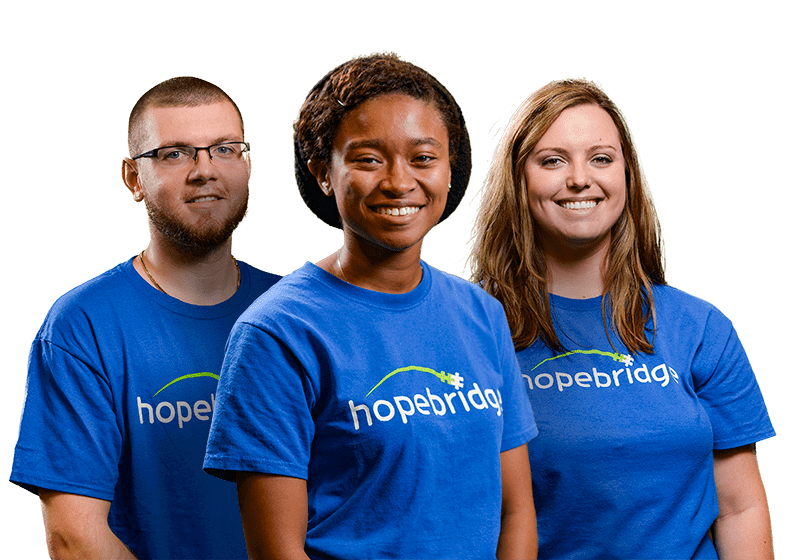The Hopebridge Fieldwork Experience
Fellowship Program at Hopebridge
Becoming a BCBA is not easy, but Hopebridge offers a helping hand (a group of hands, actually!) to help budding clinicians on this path. Our Fellowship Program for behavior analysis offers an unmatched curriculum and opportunities to gain free restricted and unrestricted hours while on the job as an RBT. Fellows receive include multi-level, multidimensional support from on-site BCBAs, company leadership, and their peers through a cohort model that provides a sense of community. Other advantages include free access to BCBA exam study materials, exam pass bonuses, funds for professional development and more.
Outpatient Fieldwork Opportunities for Speech Pathology and Occupational Therapy
Hopebridge also offers fieldwork experience and clinical rotations for aspiring speech-language pathologists and occupational therapists. Our in-center roles offer support through our university partnerships. These fieldwork opportunities provide direct and indirect observation from our knowledgeable, experienced mentors with layers of support, in addition to an unmatched interdisciplinary autism therapy experience.
The Hopebridge Clinical Experience
RBT Leveling
Want to level up within your own role? Hopebridge offers an RBT Leveling Program to help our direct therapists receive mentorship and expand their knowledge, experiences and opportunities to meet the criteria for career advancement within the centers.
The Bridge Program
This year-long program provides clinical mentorship, self-paced training and live content review for BCBAs at any point in their career to bridge any gaps in their education or areas that have left them wanting more. The Bridge Program’s training opportunities give BCBAs the potential to earn nearly half of their required CEUs to maintain certification – including ethics and supervision CEUs – which puts them on track to accrue the necessary hours for one year.
BCBA Career Pathway
With a range of defined roles for behavior analysts, BCBAs have a clear pathway for career growth, with the resources to help them reach their goals. These roles provide BCBAs with opportunities for increased leadership and professional development, all while enhancing the quality of services we provide to our patients.
Outpatient Therapies Mentorship Program
No matter where our clinicians are at in their career path, this mentorship program offers structured support and development for our occupational therapists and speech-language pathologists, both clinically and professionally. Through monthly meetings, participating OTs and SLPs learn to create goals while building knowledge and their skills repertoire through presentations and engagement activities. This program creates a valuable community so our clinicians have the opportunity to connect with each other in a meaningful way.
Hopebridge-Sponsored CEUs
We know how important – and expensive – it is for our team members to broaden their knowledge and stay up to date on the industry’s latest developments. To make continuing education more accessible, one of the big perks of working at Hopebridge is the annual stipend for conferences and workshops. Plus, Hopebridge is an official Authorized Continuing Education (ACE) Provider, enabling the therapy network to provide free continuing education (CE) events and specialized training cohorts with internal thought leaders on topics like familial support, HRE, PEAK and other neurodiversity-affirming practices for all disciplines.
Grand Rounds
At Hopebridge, our clinicians use grand rounds to present challenging patient cases to an audience of qualified experts as a way to collaborate, train junior colleagues and increase learning in areas that may fall outside of their core practices. At Hopebridge, this process consists of an interdisciplinary clinical review team designed to assist our clinicians who require extra support for specific high-risk patient programs. Our team works intensively to first support the team locally by offering individualized support, clinical recommendations and training, and if necessary, brings the case to a larger review for next steps to increase the likelihood of success. The Hopebridge approach to care has always focused on treating the whole child – not simply a diagnosis – and this is one more way we can view the bigger picture to support our families while also developing our clinicians.



 The Next Step Academy (NSA) is an initiative Hopebridge provides to our exemplary team members who are interested in clinic operations to strengthen the skill set of emerging leaders by guiding them toward a pathway of advancement. Nominated by regional leadership for their teamwork and passion for the Hopebridge mission, these Heroes work towards becoming center managers through a program that consists of 12 weeks of training, focusing on both soft and hard skills development.
The Next Step Academy (NSA) is an initiative Hopebridge provides to our exemplary team members who are interested in clinic operations to strengthen the skill set of emerging leaders by guiding them toward a pathway of advancement. Nominated by regional leadership for their teamwork and passion for the Hopebridge mission, these Heroes work towards becoming center managers through a program that consists of 12 weeks of training, focusing on both soft and hard skills development.